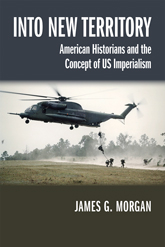|
Into New Territory
American Historians and the Concept of US Imperialism
James G. Morgan
Studies in American Thought and Culture
Paul S. Boyer, Series Editor
Shows how radical and revisionist scholars in the 1950s and 1960s first challenged the paradigm of denying that America had an empire
The idea that the United States—a nation founded after a war of independence—operates as an imperialist power on the world stage has gained considerable traction since the turn of the twenty-first century. But just a few decades earlier, this position was considered radical and even “un-American.” How did this dramatic change come about?
Tracing the emergence of the concept of US imperialism, James G. Morgan shows how radical and revisionist scholars in the 1950s and 1960s first challenged the paradigm of denying an American empire. As the Vietnam War created a critical flashpoint, bringing the idea of American imperialism into the US mainstream, radical students of the New Left turned toward Marxist critiques, admiring revolutionaries like Che Guevara. Simultaneously, a small school of revisionist scholars, led by historian William Appleman Williams at the University of Wisconsin, put forward a progressive, nuanced critique of American empire grounded in psychology, economics, and broader historical context. It is this more sophisticated strand of thinking, Morgan argues, which demonstrated that empire can be an effective analytical framework for studying US foreign policy, thus convincing American scholars to engage with the subject seriously for the first time.
James G. Morgan is an independent scholar and writer who earned his doctorate in history at the University of Southampton. He lives just outside London, England.
Praise
“In this deep exploration of the work of William Appleman Williams and other scholars of the ‘Wisconsin school’ approach to the study of the US empire, independent scholar Morgan argues that, influenced by the progressive political climate at the University of Wisconsin–Madison, Williams pioneered a groundbreaking understanding of US imperialism in the 1950s.”
—Choice
“[A] stimulating new monograph on foreign policy revisionism.”
—Reviews in History
“A significant contribution to understanding the Wisconsin School and its role in putting American imperialism on the historiographical agenda.”
—Steven Hurst, author of The Carter Administration and Vietnam
Publicity and Press Kit Resources
Click here for current & upcoming UW Press events
Download high resolution cover, color
Download high resolution cover, b/w
All images are at least 2.25 inches at 300 dpi wide; current title covers are a minimum of 1500 px wide/6 inches wide at 300 dpi. Please contact us if you need a custom size.
Media & bookseller inquiries regarding review copies, events, and interviews can be directed to the publicity department at publicity@uwpress.wisc.edu or (608) 263-0734. (If you want to examine a book for possible course use, please see our Course Books page. If you want to examine a book for possible rights licensing, please see Rights & Permissions.)
|

August 2014
LC: 2013042703 E
282 pp. 6 x 9
|

